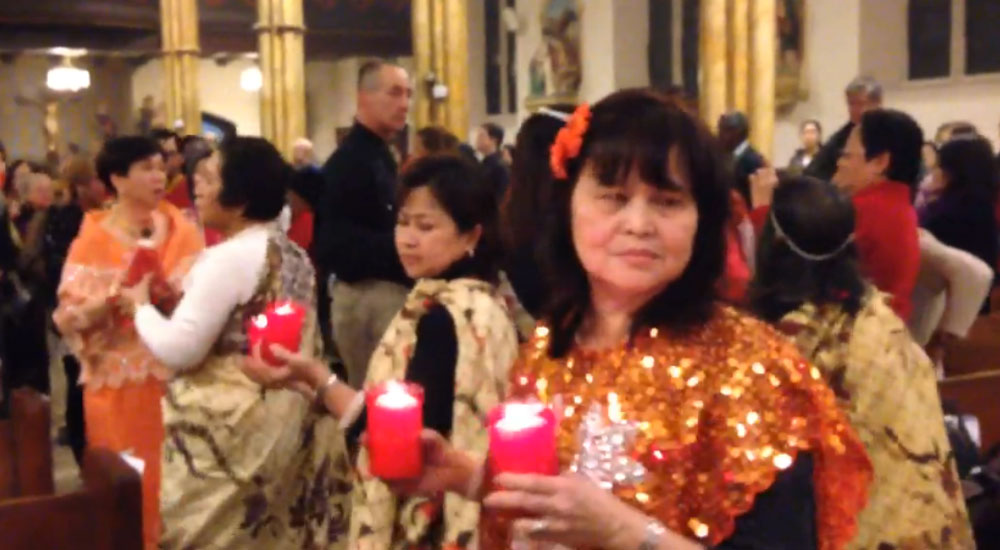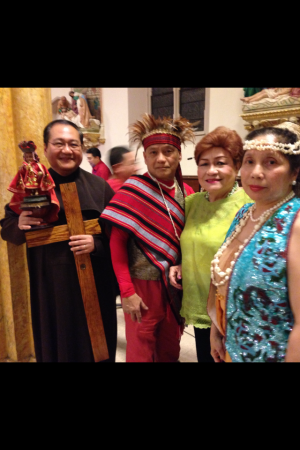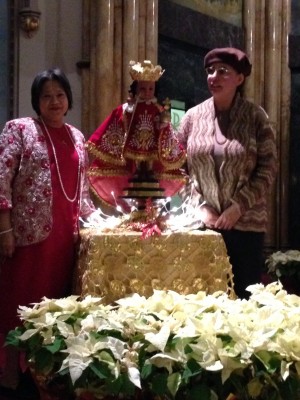Hundreds observe Sinulog in New York
NEW YORK—About 35 years ago, Betty Tancio and her husband wanted to have a child and raise a family. After years of trying, however, they were unsuccessful.
Tancio did not give up.
She says that she had “a strong feeling” at the time that if she made an offering during the Sinulog festival, a century-old dance ritual in honor of Santo Niño in her native Cebu, she would bear the child that they longed for.
But there was another hurdle. She was working as a nurse in New Jersey, and it was challenging for her to make a trip to her hometown every year to observe Sinulog on the third Sunday of January.
So, she thought, “Why not do the Sinulog here?” She then spoke to a local priest and organized the first Sinulog celebrations in New Jersey and on the East Coast.
“Five years later, I got pregnant and gave birth to my only son,” says Tancio, now 70 and retired from work. “I knew my wish was going to be granted by the Santo Niño—and any miracle like that can happen to anyone.”
Last Sunday night, Tancio and hundreds of other Filipino devotees gathered at St. John the Baptist Church in midtown Manhattan to observe the Sinulog festival. A Mass was officiated by Rev. Monsignor Oscar Aquino.
Although there were no lavish costumes and grandiose street dancing that Sinulog has been famous for around the world, some of the Filipinos who attended on Sunday wore a native garb. Others held candles in their hands, singing and dancing on the aisle toward the altar.
“I’m thankful that I am part of these festivities,” said M. Garcia, of Brooklyn, New York. “It’s fun—and it has a religious and personal meaning.”
Garcia, 50, said that she asked the Santo Niño, the statue of Child Jesus clothed in an ornate red and gold manto, to show her the path to legalize her status in the United States. She has now overstayed her US visa for over a decade.
“It’s not wrong to believe in miraculous occurrences. Perhaps the Santo Niño will help me understand why I am in this situation,” she added. “Actually, as long as I have some peace of mind and good health, I am going to be very happy.”
“Sinulog” is the Cebuano term for “current,” which portrays the street dancing to the movement of what was then Cebu’s Pahina River.
Historians say that Sinulog can be traced back to its pagan origin, as the natives danced to their native dolls. But over the years the tradition has evolved such that the Sinulog Foundation described it as the “link between the country’s pagan past and its Christian present.”
Aside from New Jersey and New York, Filipinos in neighboring states such as Connecticut and Pennsylvania are also organizing their own Sinulog festivals each Sunday in January. The celebrations could last for weeks.
Yet, according to Tancio, because the process of getting a permit to hold street events in the city can be laborious and cumbersome, the observance of Sinulog is being held in the church.
In New York, non-Filipino devotees can also be seen honoring the Santo Niño. A few converts, including a woman who used to be a Muslim and a man who was an atheist, also joined the festival.
“I have become a Santo Niño devotee since a friend introduced me to Him,” said Eleanore Gaines, 60, of Fort Lee, New Jersey. “I pray that my family members would open their hearts to the Christian faith.”
Gaines, who is Caucasian, said that any festivities, like Sinulog, that venerate a patron saint, means a lot to her. “It’s the perfect time to reflect and give thanks for everything that has been given to me.”

















